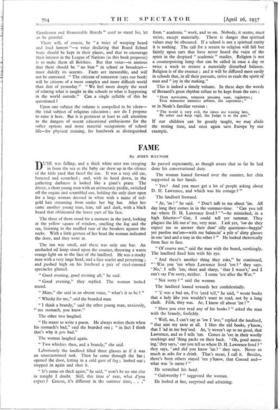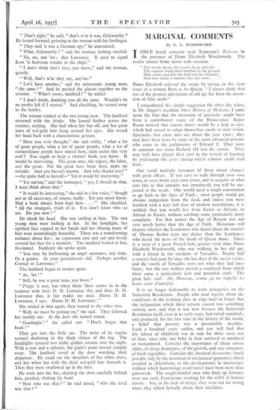FAME
By JOHN RAYNOR
DUSK was falling, and a thick white mist was creeping in from the sea as the baby car drew up in the silence of the little yard that faced the inn. It was a very old car, battered and scratched ; and, with its hood down, in the gathering darkness it looked like a giant's pram. The driver, a short young man with an aristocratic profile, switched off the engine and scrambled out, holding the only door open for a large woman dressed in white with a mane of red- gold hair streaming from under her big hat. After her came another young man, lean, tall and dark, with a black beard that obliterated the lower part of his face.
The three of them stood for a moment in the yard, looking at the yellow square of window, smelling the fog and the sea, listening to the muffled roar of the breakers against the rocks. With a little gesture of her head the woman indicated the door, and they went in.
The inn was small, and there was only one bar. An unshaded oil lamp stood upon the counter, throwing a warm orange light on to the face of the landlord. He was a stocky man with a very large head, and a face scarlet and perspiring ; and pushed high on his forehead a pair of steel-rimmed spectacles glinted.
" Good evening, good evening all," he said.
" Good evening," they replied. The woman looked round.
" Mine," she said in an absent voice, " what's it to be ? " " Whisky for me," said the bearded man.
" I think a brandy," said the other young man, anxiously, " my stomach, you know."
The other two laughed.
" He wants to write a poem. He always writes them when his stomach's bad," said the bearded one ; " in fact I think that's why it gets bad."
The woman laughed again.
" Two whiskies then, and a brandy," she said.
Laboriously the landlord filled three glasses as if it was an unaccustomed task. Then he came through the bar ; opened the door, letting in a cold gust of fog ; looked out ; stepped in again and shut it.
" It's come on thick again," he said, " won't be no one else in tonight I doubt. Still, this time o' year, what d'you expect ? Course, it's different in the summer time, . . ." he paused expectantly, as though aware that so far he had done his conversational duty.
The woman leaned forward over the counter, her chin supported in her hands.
" Yes? And you must get a lot of people asking about D. H. Lawrence, and which was his cottage ? "
The landlord frowned.
" Ar, 'im ! " he said. " Don't talk to me about 'im. All day long they comes in in the summer-time. Can you tell me where D. H. Lawrence lived ? ' "—he mimicked, in a high falsetto—" Gar, I could tell yer surnmat. They plagues the life out o' me, very near. I ask yer, 'ow do they expect me to answer their dam' silly questions—beggin' yer pardon ma'am—with me balancin' a pile o' dirty glasses in one 'and and a tray in the other ? " He looked rhetorically from face to face.
" Of course not," said the man with the beard, soothingly. The landlord fixed him with his eye.
" And there's another thing they asks," he continued, " Was you 'ere when Lawrence lived 'ere ? ' they says. No,' I tells 'em, short and sharp, that I wasn't,' and I can't say I'm sorry, neither. I come 'ere after the War."
" Not sorry ? " said the woman.
The landlord leaned towards her confidentially.
" 'E was a bad un, I've 'eerd tell," he said, " wrote books that a lady like you wouldn't want to read, not by a long chalk. Filth, they was. Ar, I know all about 'im ! "
" Have you ever read any of his books ? " asked the man with the brandy, foolishly.
" Well, no, I can't say as 'ow I 'ave," replied the landlord, " that aint my taste at all. I likes the old books, y'know, that I 'ad in me boy'ood. Ar, 'e weren't up to no good, that Lawrence, and so I tells 'em. Comes in 'ere in their woolly stockings and 'iking packs on their back. ' Oh, good morn- ing,' they says, can you tell us where D. H. Lawrence lived ? ' they says, and did you know 'im ? ' they says. Never so much as asks for a drink. That's mean, I call it. Besides, there's been others stayed 'ere y'know, that Conrad and— what was 'is name ? "
He scratched his head.
" Galsworthy ? " suggested the woman. He looked at her, surprised and admiring. " That's right," he said, " that's w'at it was, Galsworthy."
He leaned forward, pointing at the woman with his forefinger. " They said 'e was a German spy," he announced. " What, Galsworthy ? " said the woman, looking startled. " No, no, not 'im ; that Lawrence. 'E used to signal from 'is bedroom winder to the ships."
" I don't think that's true, you know," said the woman, quietly.
" Well, that's w'at they say, any'ow."
" Let's have another," said the aristocratic young man, " the same ? " And he pushed the glasses together on the counter. " What's yours, landlord ? " he added.
" I don't drink, thanking you all the same. Wouldn't be no profits left if I started." And chuckling, he turned away to the bottles.
The woman winked at the two young men. The landlord returned with the drinks. She leaned further across the counter, smiling. She had taken her hat off, and her great mass of red-gold hair hung around her eyes. She tossed her head back with a characteristic gesture.
" Have you ever thought," she said softly, " what a lot of great people, what a lot of queer people, what a lot of extraordinary people have stayed here, slept under this very roof ? You ought to keep a visitors' book, you know. It would be interesting. The great ones, the rogues, the fakes, and the great. For the great have been here, make no mistake. And you haven't known. And why should you ? " —she spoke half to herself—" Yet it would be interesting."
" Yes ma'am," said the innkeeper, " yes, I should do that. I must think about that."
" It would be interesting," she said in a low voice, " though not at all necessary, of course, really. Yet you never know. Had a book always been kept here . . . " She chuckled. " All the strangers, think of it. You don't know who we are. Do you now ? "
He shook his head. She was smiling at him. The two young men were looking at her. In the lamplight, her uptilted face cupped in her hands and her shining mane of hair were astonishingly beautiful. There was a transforming radiance about her ; an expression rare and sad and lovely crossed her face for a moment. The landlord looked at her, fascinated. Suddenly she spoke again.
" You may be harbouring an angel unawares, any time. Or a genius. As your precedessors did. Perhaps another Conrad or Lawrence."
The landlord began to mutter again.
" Ar, 'im ! "
" Still, he was a great man, you know."
" P'raps 'e was, but when them 'ikers comes in in the summer with their D. H. Lawrence this and their D. H. Lawrence that, it fair makes me mad. Damn D. H. Lawrence, I says. Damn D. H. Lawrence ! "
She smiled at him again, then turned to the other two.
" Well, we must be getting on," she said. They followed her meekly out. At the door she turned round.
" Goodnight ! " she called out. " Don't forget that book ! "
They got into the little car. The noise of its engine seemed deafening in the thick silence of the fog. The headlights sprayed two milky golden streams into the night. With a roar and a splutter, the giant's pram moved jumpily away. The landlord stood at the door watching their departure. He could see the shoulders of her white dress, and her white hat with the thick red-gold hair beneath it. Then they were swallowed up in the mist.
He went into the bar, shutting the door carefully behind him, puzzled, shaking his head.
" Now who was that ? " he said aloud, " who the devil was that ? "























































 Previous page
Previous page